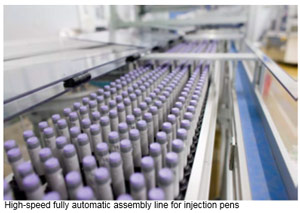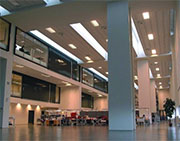“A brilliant medical device idea, but is it technically feasible and scalable?” Phillips-Medisize regularly addresses these questions when developers and customers discuss their first medical device design with the renowned outsourcing partner.
Phillips-Medisize – Medtec Europe, Stuttgart/Germany, April 12 – 14, 2016, Stand 3B29
“A brilliant medical device idea, but is it technically feasible and scalable?” Phillips-Medisize regularly addresses these questions when developers and customers discuss their first medical device design with the renowned outsourcing partner. The dialogue leads from R&D through to the ready-for-use device, in sterile packaging, which has passed all validations, clinical tests etc. Feasibility presupposes HCD (human centered design), DFM (design for manufacturing) and DFA (design for assembly) based on engineered-in scalability. Positive results ensure that production performance – derived from the feasibility condition of the first 3D-printed build or pilot batch – can be raised proportionally and/or linearly in a defined scale. During MEDTEC EUROPE, customers and prospects can discuss such a supply chain collaboration with Phillips-Medisize, with hands on numerous exhibits.
Ready for a medical device project! At the beginning of the project – according to Phillips-Medisize – the customer and their outsourcing partner should consider whether commercial production volumes will achieve target cost when considering DFM and DFA analyses. The feasibility study leads the R&D experts from the first reproduced pilot components to the preproduction series and finally to the scalability into millions of units of this medical device. Principal assumptions: HCD standards, fulfilment of validation, certification, clinical tests and conscientious quality surveillance mechanisms must be met. Not to forget: 80% of a product’s cost is determined during the first 20% of its development timeline. Scalability means that the production scale can be raised and/or varied from a basic low volume to the desired volume or magnitude. In the case of a specialised, niche drug-delivery device, for example, this may mean progressing from low-volume 3D-printed components assembled by skilled technicians to a ‘manumation’ (combination of manual assembly and automation) assembly process conducted by a trained operator. For commonly used drug delivery devices, this typically means developing processes to support engineering builds, then clinical supply, and finally a fully automated or high-speed automation process, supported by developmental single-cavity tooling and incrementally higher multi-cavity tools. Scalability must encompass this extent of flexibility.
Numerous exhibits provide opportunities to discuss the route of scalability: on stand 3B29, Phillips-Medisize presents a complete showcase of customised medical and diagnostic devices such as disposables, insulin pens, glucose meters, inhalers, single-use surgical devices and consumable diagnostic components, tube sets, catheters, diagnostic arrays, and much more.
From the initial idea to the ready-for-use medical device/product in sterile packaging: Phillips-Medisize provides a complete supply chain for customers. Last, but not least: quality control and quality assurance are essential factors with products in medical device technology. At Phillips-Medisize, production is monitored under a cross-process method by means of high-priority quality assurance standards in accordance with ISO 13485 and/or the corresponding FDA standards and Good Manufacturing Practice, GMP. Phillips-Medisize tests and checks all products at its in-house facility with appropriate measuring technology and also carries out cytotoxicity tests, bio burden determination, LAL and performs risk analysis by means of FMEA. Validation of the processes follows industry standard DQ-, IQ-, OQ- and PQ stages.
About Phillips-Medisize Corporation:
Phillips-Medisize is a leading global outsource provider of design and manufacturing services to the drug delivery, consumable diagnostics and medical device, and specialty commercial markets. The company has annual sales of over $600 million with 80% of the total revenue coming from drug delivery, medical device, primary pharmaceutical packaging and diagnostic products such as: disposable insulin pens, glucose meters, specialty inhalation drug delivery devices, single use surgical devices and consumable diagnostic components. Phillips-Medisize Corporation features a list of blue chip medical device, pharmaceutical and commercial customers. The company partners with its customers to provide design and development services which accelerate speed to market of innovative products and then works with its customers to deploy advanced automated assembly and quality control technologies which reduce manufacturing cost while improving quality. The company’s core advantage is the knowledge of its people to integrate design, molding, and automation to drive low cost and high quality manufacturing solutions. Phillips-Medisize Corporation is headquartered in Hudson, WI, and employs over 3,400 people in 14 locations throughout the United States, Europe, Mexico and China. The company also has design centers in Wisconsin, California, and The Netherlands.
Media Contact: Paula Kasper
E-mail: [email protected]




